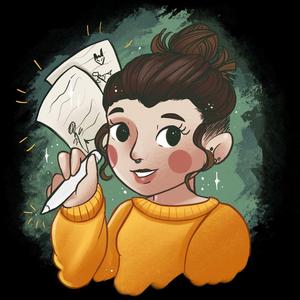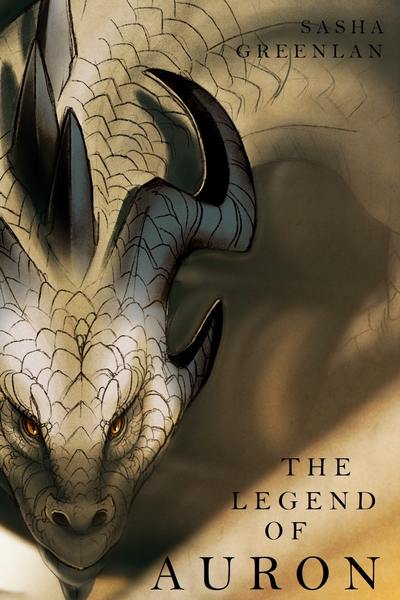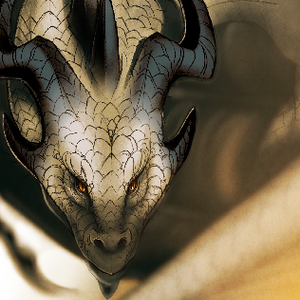The journey back from the tower was no easy feat, not even for a Drakkir. It usually took the better part of a day if the winds were not in one’s favor. Luckily enough the wind had quieted down as the sun fell below the ridge, and Izac’s vinthound kept up easily. The journey was mostly silent, for talking through the dust was usually an impossible task. Izac had once asked what the name of Ezerella’s hound was. She simply scoffed at the notion and continued onward. He did not speak again.
Night was upon them, moons glowing brightly even through the clouds as the soaring spires of Serath towered over them. The mighty gates forged from titan bone were painted black and gold, several guards positioned on either side wearing their drakilisk-hide armor. Ezerella paused to see if they had noticed them, but it seemed like Izac’s illusion had been maintained throughout their journey. She halted her mount and turned to face him.
“I don’t see a way to get you into the city without permission,” she said.
Izac lowered his face sash once more. “Do the gates not open?”
“Not without the guards’ consent.”
“Then get their consent.”
Ezerella felt the fire in her chest flare up. A part of her wanted to tell this man to leave, to go back to the mainland where he came from. He had no right to make such demands of her. But his eyes, a crystalline blue, and his silky white hair… not to mention the fact that for some strange reason, she was the only one who could see him due to some foreign magic he had not yet explained, something propelled her onward.
She dismounted, then waited for Izac to do the same. Holding the reigns of both hounds, she walked toward the gate while Izac followed. Sure enough, the guards looked to her and the hounds, but did not notice the man to her left.
“What’s this?” said a guard.
“This central vinthound was roaming the plains,” said Ezerella.
“And the other?”
“I was riding when I found it,” she said.
The guard stepped forward, examining Wrana. She ran her hands along the saddle, the reigns. Wrana wriggled slightly, clearly uncomfortable with the attention of strangers. The guard then turned to Ezerella.
“There’s an inscription, and fittings. Where is the rider?”
Ezerella swallowed. She wanted to look to Izac, to make sure he was indeed invisible to the guards. “I saw no one riding her. No other sentry did either.”
The guard folded her arms. “Hm. A good steed, it seems. Although the long fur won’t last long in this climate.”
“I thought we might kennel it, see what the Ralzana wishes to do with it,” said Ezerella.
The guard nodded. “Indeed.” She turned to the others and motioned with her hands. They nodded and began opening the gate. “Take it to the kennel. The myzra will take it from there.”
Ezerella nodded a thank you. She spared a glance over her shoulder at Izac, who followed quietly through the gates, unnoticed. They entered the main bazaar, the central hub of the city of Serath. The pride of the Drakkir, an oasis in the dust.
“It’s true,” Izac breathed from behind her. Ezerlla pulled her sash down to rest on her shoulders and allowed a grin to curl her lips. His eyes were on the scene before them. The center was buzzing with activity: women washing their clothes in the collective basins; women selling all kinds of produce and delicacies at their respective market stalls; women strolling the stone pathways wearing garments of green and gold, leather tying back their dark hair. There were a few guards patrolling the area, narrow eyes scanning for anything out of the ordinary—all of them women.
“What’s true?” Ezerella said teasingly, watching as Izac’s eyes trailed the movement of a belly dancer’s body while another woman played a pair of drums beside her.
Izac laughed as if he’d just been told a mild joke. “The shadowkin,” he said. “You’re all women.”
Ezerella heard it many times as a child. Drakkir elders and shamans spoken often of the ancient evil that cursed their race to die out gradually and miserably, providing them with no male descendants to speak of. But as time passed, the Drakkir took interracial mating over going entirely extinct. The people of the mainland often clung to the stereotype that the Drakkir women captured their mates against their will, did their business through use of death magic, and then exiled the men into the cold, dry wastes with no food or water, doomed to wander helplessly to their deaths. But the validity of these stereotypes was questionable, since not many people dared venture anywhere near Death’s Pass who hoped to live. The phenomenon was undeniable, however, and every single time a Drakkir woman became pregnant from an outside lover, the child was biologically female.
“I didn’t think it was possible,” said Izac. “How could it be possible? The Drakkir are a flourishing civilization, how do you manage?”
“Men like you,” Ezerella said. She caught a look from Izac and felt her cheeks burning. “I mean to say, travelers who dare enter Serath. And the Drakkir send sydraan every cycle to the mainland.”
“Sydraan?” Izac said.
Ezerella smiled. “A pilgrimage of sorts. A convoy of Drakkir with the sole purpose of procreation.” She paused. “From what I have heard, they are not always well received.”
“Ah,” said Izac. “In the mainland tongue they are sometimes called heirless harems.”
Ezerella smirked. “Somehow, I am not surprised.”
“Have you ever been a part of one?” Izac said.
Ezerella felt her heart flutter once more. She did not understand this man’s interest in her. “I am not a sydra.”
“What do you mean?”
“It is not my role.” She continued onward through the crowd of Drakkir citizens, Izac close behind.
“I’d love to know more about your role,” he said. “How is it different from other roles?”
“Do Imperials not have roles? Castes?” Ezerella slipped between two wandering Drakkir who did not seem to see their approach.
“No,” said Izac. “From what I’ve seen, Imperia is not very strict on what role one plays.”
“We are all servants of the Equilibrium, under the Ralzana’s protection,” said Ezerella. “We are born into our castes and each of us provide for the whole.”
“A communal good?” said Izac.
“Precisely. I was not born a sydra, and so will never join a sydraan and venture into the mainland to find a mate.”
“Does that bother you?”
“Why should it?”
Ezerella did not look at her strange companion. She did not tell him that she often dreamed of entering the Heart of the First with her sydraan, dreamed of being swept away by a handsome elven sorcerer who could conjure up anything she desired. Folkstories for children, for little younglings who did not have a care for the communal good or the Ralzanen, and who gleefully consumed the most unhealthy of ideals set forth by ancient societal tyrants. Regardless, she certainly would not share such information with a strange man who had not yet answered any of her questions.











Comments (0)
See all